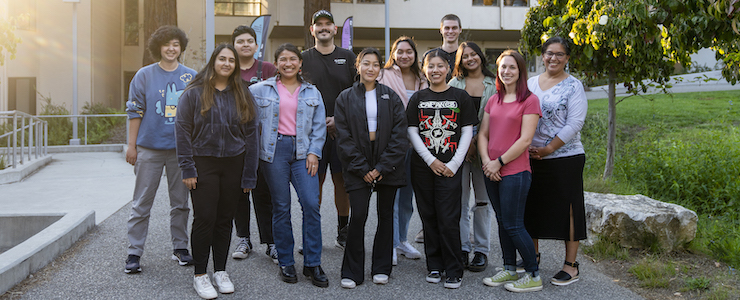Undergraduate Program
Latin American and Latino Studies (LALS)
The Latin American and Latino Studies (LALS) Department integrates the study of Chicanx and Latinx communities in the United States with analysis of the histories, politics, cultures, and societies of Latin America and the Caribbean.
LALS courses address changing political, social, economic, and cultural realities, including migration and transnational communities; gender, racial, sexual, and ethnic relations and identities; social movements; diverse forms of cultural expression; political and economic restructuring in Latin America; and the challenges of political and economic inequities and empowerment for Latinx communities in the United States.
Students in LALS learn to develop thoughtful analysis and clear arguments on complex topics. Through internship and field study experiences, students can acquire useful, pre-professional skills in any of the following key areas: community development/advocacy, public policy, education, journalism, media, performance, and research/writing, among others.
Program Learning Outcomes
Students should expect each of their LALS courses to cover one or more of our program learning outcomes, with all students developing proficiency or competency in the following four areas by the completion of their LALS degree program:
- Critical Thinking. Ability to analyze from a transnational/transborder/translocal perspective—to see the interconnections between Latin American and Latino issues, people, ideas, problems, and solutions. This includes key skills, such as understanding sources, comparing arguments, analysis, and historical perspective.
- Research Methods. Working knowledge of social scientific and/or humanistic approaches to LALS relevant topics. This includes acquiring qualitative and quantitative skills, gathering or obtaining research data, finding/using primary sources, and other research methods.
- Communication. Key communication skills, including written, oral presentation, and digital, including an understanding of media sources and ability to apply media literacy to cross-cultural analysis.
- Lifelong Learning Skills. Acquisition of practical hands-on skills in community engagement, cross-cultural fluency, familiarity with Latin America, and familiarity with Latino experience acquired through experiential learning while working with community and civic organizations.
If you are wondering how these learning outcomes position you for a career outside of academia, keep reading for our suggestions of how to describe your LALS skills in a professional context.
Putting Your LALS Degree to Work
When you are creating your résumé, writing your cover letters, and applying for jobs, feel free to use the language we use in our catalog description, or tweak it to fit your needs. For instance:
- Critical Thinking = excellent problem-solving skills with global/intercultural fluency
- Research Methods = experience in data-driven analysis
- Communication = extensive communication skills, including experience in oral presentations and cross-cultural literacy across digital platforms
- Lifelong Learning Skills = ability to understand new concepts and explore new ideas through community engagement and collaborative/team efforts
FYI, the skills and abilities described above are exactly what employers are looking for! This information--and more--can also be found in our advising pages.
Check out our orientation video!

